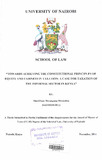| dc.description.abstract | The main source of revenue for the Kenya government is taxation. The purpose of government is
to ensure the general peace, promote the general welfare, secure for each individual the
inalienable rights to life, liberty, social justice and the rule of law. These are the proper ends of
government, and are therefore the ends which in every scheme of taxation should be kept in
mind. The taxation system in Kenya however is skewed. There is excessive taxation on the same
income bracket while the informal sector is not taxed leaving the persons in the formal sector to
shoulder the burden of taxation. It is important to bring the informal sector under the tax regime
in order to lessen the burden on the formal sector.
The specific study objectives are to; discuss the current Constitutional, legal, institutional and
policy framework on taxation in Kenya under the new Constitutional dispensation. It also
intends to review and recommend the international best practices in achieving taxation equity
which are relevant to Kenya and applicable to the rest of the East Africa Community generally.
It further makes proposals towards an effective, efficient and equitable taxation of the informal
sector.
The data utilized in this study is both qualitative and quantitative. It was obtained from both
primary and secondary sources. The data from secondary sources was acquired from the internet,
books and journals while the data from primary sources was obtained from interviews conducted
on small business owners and specialists in the tax sector in Kenya.
From the analysis it was apparent that due to several institutional and policy obstacles, the
informal sector in Kenya has not been fully netted into the inc
nd equity in imposing the tax burden. This should enhance the provision of social and
economic rights. Efficient taxation of the informal sectorshould also help lower the percentage
ofincome taxation in Kenya andplaya centralrole inbuilding and sustaining thepower of state
andshaping itstiestothe citizenry.
The study concludes that tax reforms should givepriority to the following areas: taxation of the
informal sector by designing simplified registration processes, establishing a comprehensive
database of the informal sector and give the sector treatment other than that provided by the
current methods and tax code. This study finally makes specific recommendations on the
legislativeandpolicy measures that shouldbringtheinformalsectorintothetax regime. | |

